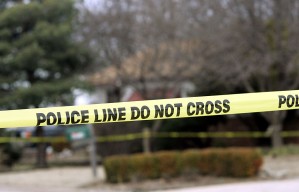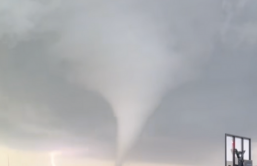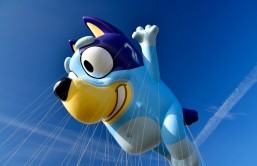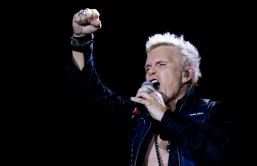Lukas Nelson's profile continues to grow at a rapid yet sustainable pace, as his band Lukas Nelson & Promise of the Real recently released a remarkable new album, "Something Real," while its namesake is on call to work with heavy hitters like Neil Young and Bob Weir.
Playing a self-proclaimed brand of "cowboy hippie surf rock," on "Something Real," Nelson, the son of country icon Willie Nelson, and the burgeoning band take another step forward. And as Nelson sees it, the next album will be even better.
"We already have almost another album recorded, at least the demos are done," Nelson says in an interview with HNGN, revealing that he's also wirting with the aforementioned Weir of Grateful Dead fame and planning a record with kindred spirit Shooter Jennings. "This record that we're releasing now is two years old, and that's kind of frustrating sometimes to put a snapshot out of a 2-year-old piece of art, but it's the nature of the business, and I'm already excited about the next one. We'll put it out in the fall or sometime soon."
Promise of the Real - Corey McCormick (bass), Anthony LoGerfo (drums) and Tato Melgar (percussion) - is Nelson's top priority. That said, he is an artist of many ambitions, who, along with his band and brother Micah recorded with Young on his 2015 protest album "The Monsanto Years," played on Young's subsequent tour and has been a featured member in his dad's band.
With all of this in mind, we spoke with Nelson about the making of his group's latest album, how he embraces Willie's legacy and why sometimes music is more than just music.
What was your mindset going into this album?
It's funny. We hadn't released anything in a while, but we knew we needed to get something out. We went down to San Francisco and got into a Victorian mansion called Westerfield House. It's been a home to the likes of Janis Joplin and Big Brother and the Holding Company and Russian embassy and a speakeasy,
What kind of impact did that atmosphere have on the music?
I'd say 75 percent of that material is San Francisco-born, so the vibe can't help but be there.
Why did you put the song "San Francisco," made famous my Scott McKenzie, on the album? Was it emblematic of the album?
Yeah, we were there, we were feelin' it, I wrote a bunch of music while I was there absorbing the vibes. There's a certain darkness and a big change happening between the classes. On one hand you have an amazing economic growth and a lot of jobs being created and people making a lot of money working on things that are helping our world, arguably for the better, in the tech industry and all of the industries that are going up there, and then you have all those artists and people that can't afford to live in those places anymore. So there's a lot going on there, and I think that's reflected in the record.
The album has a really live sound. It doesn't sound like there were a lot of overdubs.
There weren't many overdubs. We did a live track in one of the rooms, and I'd go up to the tower sometimes overlooking the city and I'd sing my vocals there and we'd light candles. It was basically live. We just put all the amps in different rooms and went for it.
When you play concerts, do you try to stick to the album versions or leave things open-ended so you can jam?
Live is where we're at. Live is where we really shine, so we've just grown so much as a band. We like to improvise, we like to change things up.
What does "cowboy, hippie, surf rock" mean?
Well, I was born in Texas, I also grew up in Hawaii, I surf, and I like to rock 'n' roll. I grew up with country music and I grew up with rock 'n' roll, so that blend is kind of what we jokingly refer to as "cowboy, hippie, surf rock."
What kind of music were you exposed to growing up, and what did you think of your dad's music?
My dad's music is what I grew up listening to, and he's always been the greatest dad anybody could ask for. He's led by example, and he's given me my space. I'm not trying to run away from it at all. I'm proud that he's my dad. I play my own music, but I'm also influenced by him and I sound like him when I sing. I can't help it, and I'm not running away from it, but I do think I've learned to play guitar and I've learned to play piano and I've learned how to write music and songs, so I consider myself a growing artist with respect to my father but separate from him.
Have you befriended any musicians in the same situation?
Well, Shooter (Jennings) and I are working together. We recorded stuff together, and we've done some tours together, so he and I have a lot in common, our dads being best friends and him growing up in a similar situation. He's about the best guy you can be friends with.
How has your dad reacted to your growing success?
I think he's really happy that I'm able to do what I want to do. He grew up in a world where it was a lot harder to get out there unless you played the game a little bit, and the irony is once he stopped playing the game and went down to Austin and grew his hair long and recorded "The Redheaded Stranger" and "Troublemaker" and worked with Waylan and all that, that's when the game stopped, and that's when he actually made it. He didn't make it until he was 40 years old. I've learned a lot from him how to deal with the industry, and I'm still learning.
When did you realize you wanted to follow in your father's footsteps and become a musician?
I've always known what I've wanted to do. At 6 or 7 years old I had a dream that I was in front of like a million people, alone up there, and I was terrified, and I call it my conscious awareness, where usually you'd say you're looking at the audience and what was more comfortable for me to shrink my awareness down to the center of my chest and look out through my chest, look out through my heart at the audience, and sing from that place. I had this vivid dream that this happened to me, and when I started singing from that place, I felt that people started cheering and the crowd went wild, the million people.
Neil Young and Willie Nelson are activists. Do you feel your music is more than just about music?
Yes. I feel like music is art, and art is also social commentary. Now I don't believe it should all be social commentary, but I also believe that there is a role for social commentary in all art, music. I'm not one to shy away from that, although I do like art for the sake of art at the same time as well. I think there's a good balance and a well-rounded artist will incorporate what he believes or what he's come to know or a certain wisdom.
What was it like to record and tour with Neil for "The Monsanto Years"?
I mean it was amazing. Working with Neil was the most incredible thing. We're going out to Europe, we're going to jazz fests and we've got a live album that he's putting together right now, and he's just so creative and fun to work with. It's a highlight of my life to do these things with him, no matter what it is, no matter what it's for.
How would you compare "Something Real" and your next album?
The upcoming album is more mature, it's just what you would expect from something two years later from a band that's constantly getting better. I'm looking forward to releasing this record, and I think the next one is going to be even better, and the next one after that is going to blow people's minds, and hopefully this one will in some ways too.
What are your thoughts on "bro country"?
Man, I don't know about genres, music is music. You like it, you like it. Some of the pop stuff is good. There are some incredible songs being recorded. I don't hate on anybody. I may not align myself to certain things, but I don't judge, and I think that there's some great music out there. The music with integrity shines through.









